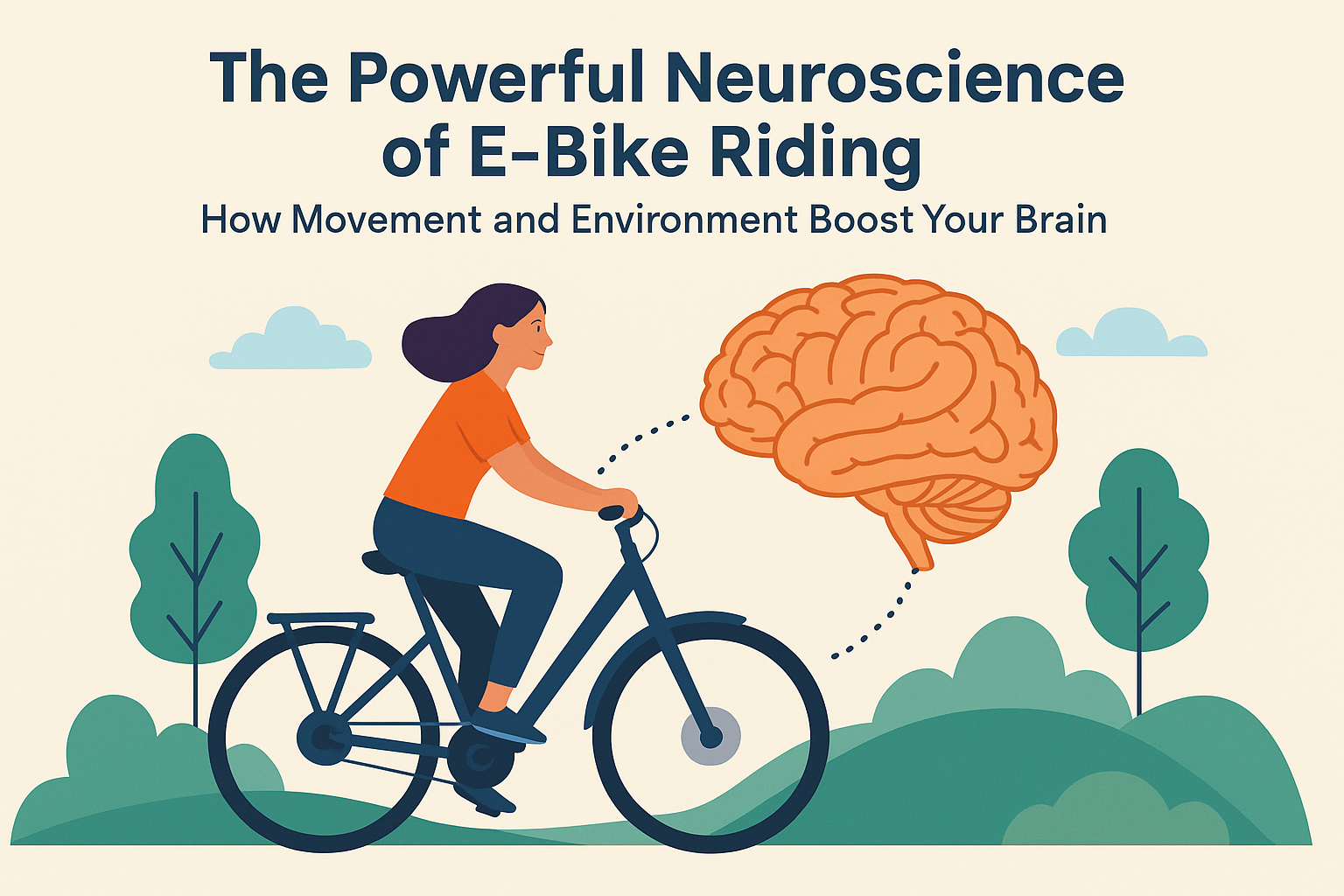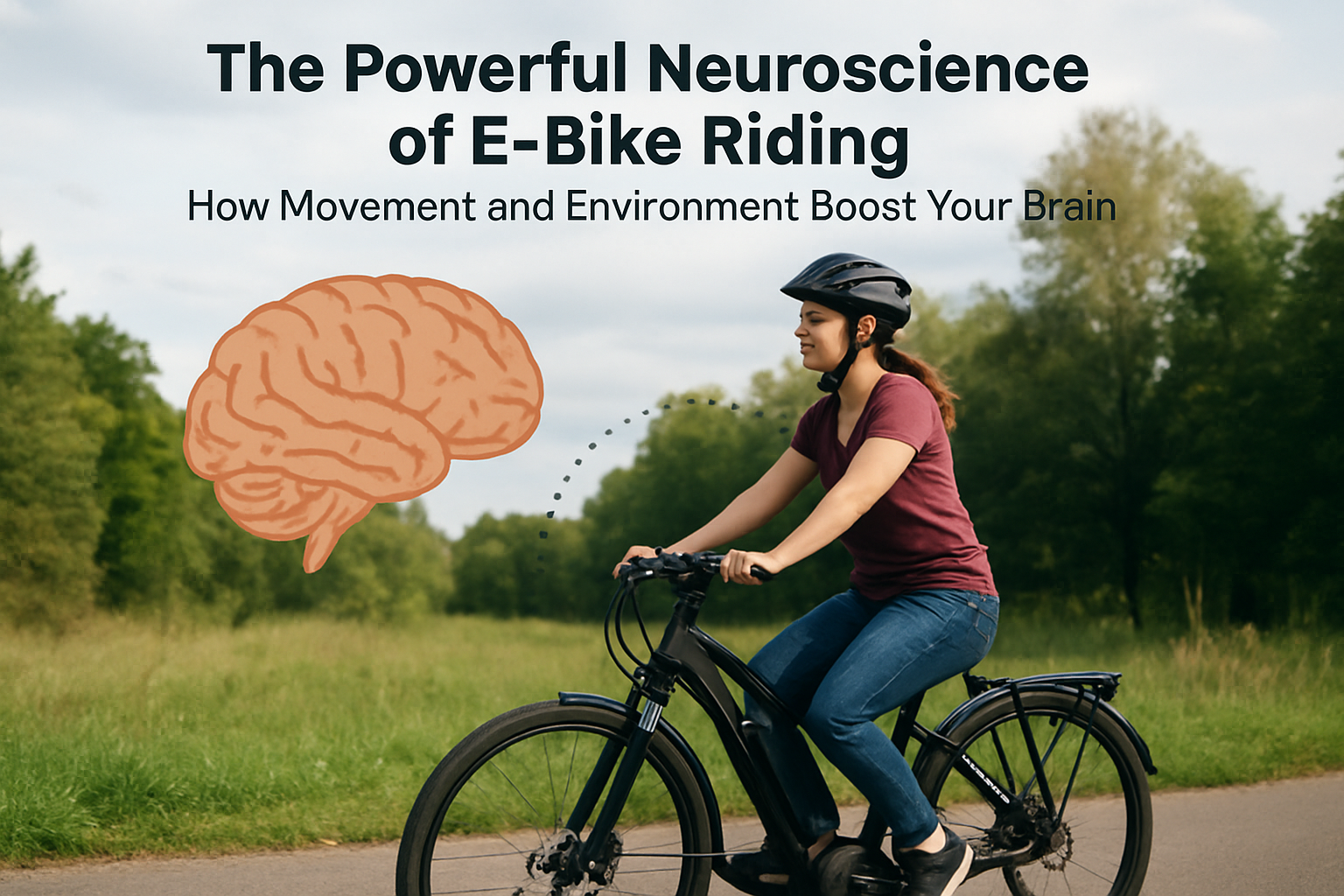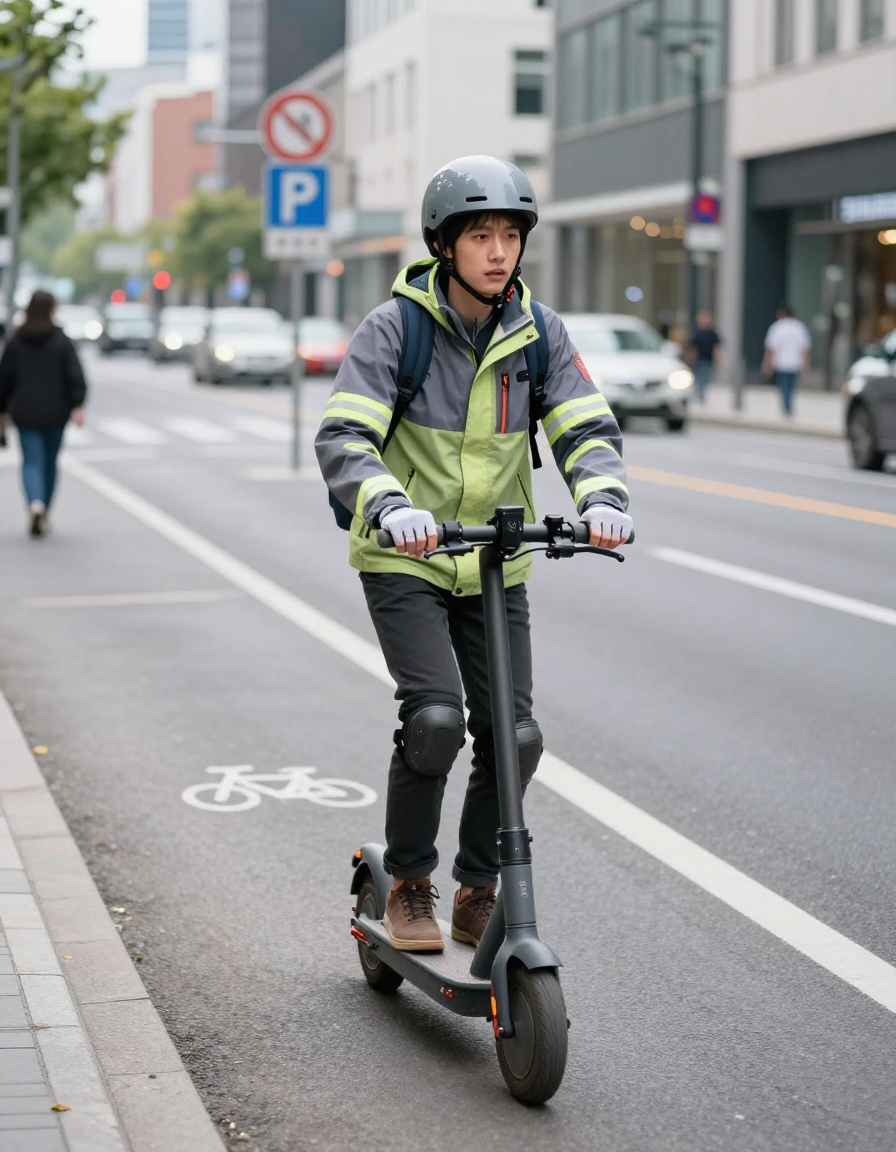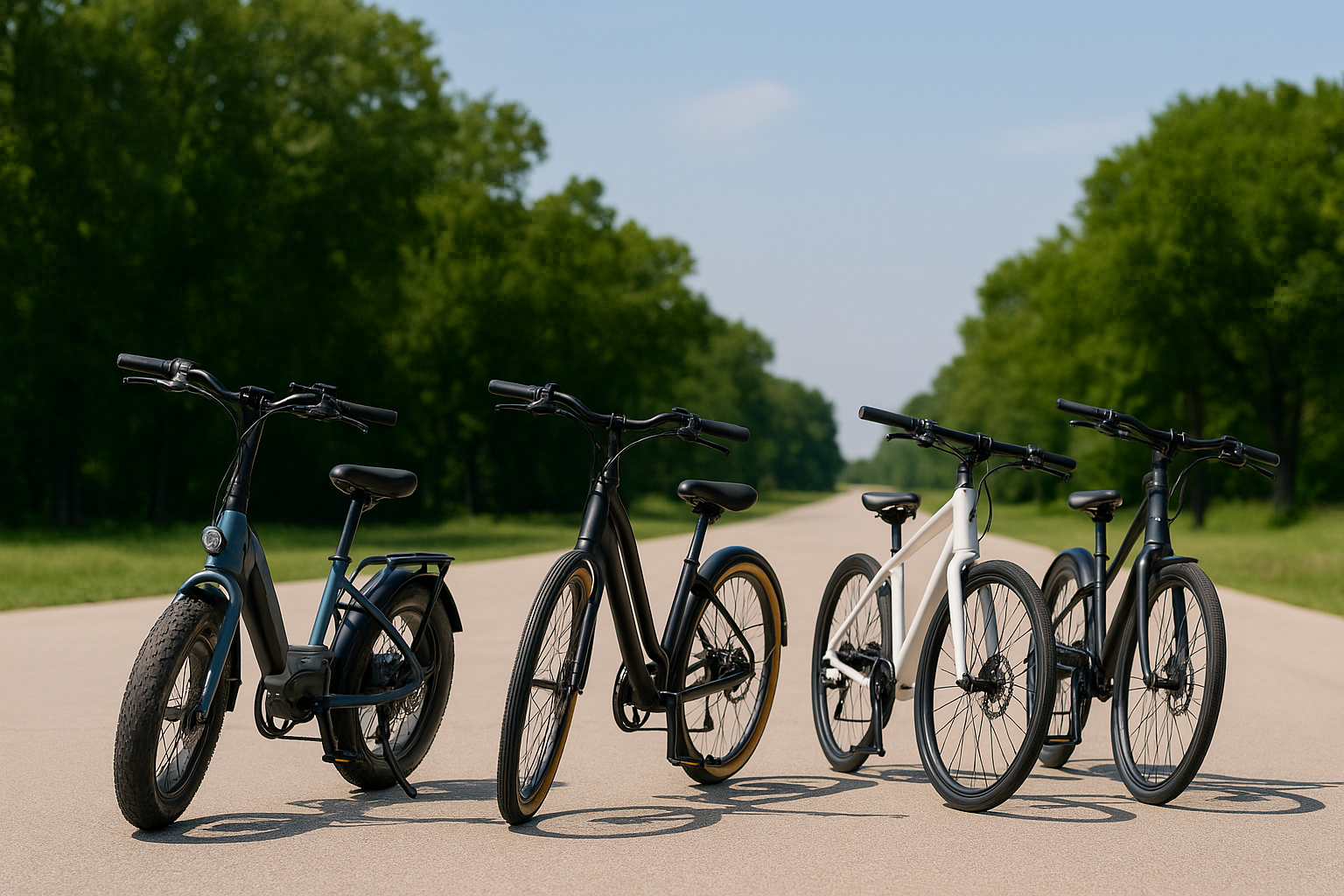The Powerful Neuroscience of E-Bike Riding: How Movement and Environment Boost Your Brain (5 Parts)

The Powerful Neuroscience of E-Bike Riding reveals a profound and often overlooked truth: riding an electric bike is not merely a mode of transportation—it is a dynamic exercise for the brain, a catalyst for emotional stability, and a stimulator of cognitive performance.
Unlike conventional forms of exercise, e-biking merges rhythmic pedaling, postural balance, and continuous environmental interaction, creating a multisensory experience that actively engages the nervous system. This intricate coordination enhances neural communication between the cerebellum, motor cortex, and prefrontal regions, leading to sharper reflexes, improved decision-making, and heightened mental alertness.
The Powerful Neuroscience of E-Bike Riding demonstrates that even with the electric assistance reducing physical strain, riders experience significant neurochemical benefits. Endorphins released during riding alleviate stress, while dopamine pathways associated with motivation and reward are stimulated, reinforcing both focus and a sense of accomplishment. The combination of gentle physical exertion with rich sensory input from outdoor environments—changing scenery, sounds, and textures—promotes neuroplasticity, allowing the brain to form new neural connections and adapt more effectively to challenges.
Moreover, studies confirm that integrating e-biking into regular routines supports mental resilience, emotional regulation, and cognitive clarity, making it one of the most accessible non-pharmaceutical strategies for enhancing overall brain health.
This underscores why researchers are increasingly fascinated by the Powerful Neuroscience of E-Bike Riding: it is not only a recreational activity but a scientifically supported tool for optimizing mental and emotional well-being. For further insight, see this study on exercise and the brain.
E-biking improves mental health, cognition, and mood — but monitoring your ride, battery, and effort ensures maximum benefit.
These verified tools help you optimize your e-bike experience for both mind and body.
-
Ride Efficiency Tracker —
monitor your energy use and riding patterns to optimize exercise and cognitive benefit. -
Cadence to Speed Converter —
track pedaling rate versus speed to maintain consistent aerobic activity. -
Range Calculator —
plan routes that keep you riding comfortably without stressing your battery or your body. -
Motor Power Estimator —
check motor effort needed for hills or varied terrain, balancing workout intensity and brain stimulation. -
Battery Lifespan Calculator —
track battery health to avoid mid-ride interruptions and ensure smooth, stress-free journeys.
Read More!
🧠 How the Powerful Neuroscience of E-Bike Riding Stimulates the Brain
- Sensorimotor Activation: The coordinated act of pedaling, balancing, and steering on an e-bike engages multiple brain regions simultaneously, including the cerebellum, motor cortex, and basal ganglia. This intricate sensorimotor activity strengthens the communication pathways between the brain and body, enhancing reflexes, coordination, and overall motor control. The Powerful Neuroscience of E-Bike Riding reveals that even light adjustments in balance or steering stimulate neuroplasticity, helping the brain adapt and refine its responses over time.
- Endorphin and Dopamine Release: Riding an e-bike triggers the release of key neurotransmitters that support emotional and cognitive well-being. Endorphins naturally reduce stress and promote a sense of euphoria, while dopamine reinforces motivation, attention, and goal-directed behavior. Remarkably, the Powerful Neuroscience of E-Bike Riding shows that even with motorized assistance, riders experience these neurochemical benefits, making e-biking a powerful tool for maintaining mental resilience and focus in daily life.
- Environmental Feedback and Sensory Enrichment: Unlike indoor exercise, outdoor e-biking immerses the brain in a constantly changing sensory environment—visual landscapes, varying textures, sounds, and even scents. This sensory richness enhances cognitive flexibility, stimulates creative thinking, and helps maintain attention. Neuroscience demonstrates that exposure to natural environments amplifies the brain’s restorative processes. Learn more about these effects at APA: Nature and mental health. Integrating this with rhythmic movement, the Powerful Neuroscience of E-Bike Riding maximizes both neurocognitive engagement and emotional well-being.
Taken together, these mechanisms illustrate why the Powerful Neuroscience of E-Bike Riding is gaining increasing recognition. The synergy of motion, rhythm, and environmental interaction creates a holistic brain-boosting experience that supports memory, focus, emotional balance, and overall cognitive vitality.
🌳 Cognitive and Emotional Benefits of Outdoor E-Biking
The Powerful Neuroscience of E-Bike Riding highlights that time spent outdoors is not just enjoyable—it is profoundly restorative for the brain. Natural environments provide rich, multi-sensory stimulation that enhances attention, memory, and executive function.
When outdoor exposure is combined with cycling, these cognitive benefits are amplified: navigating trails, parks, or urban streets requires continuous sensory processing, spatial awareness, and decision-making, all of which actively engage the prefrontal cortex and hippocampus.
This immersive experience reduces mental fatigue, improves alertness, and stimulates creative thinking, making the brain more adaptable and resilient. The rhythmic motion of pedaling functions like a moving meditation, synchronizing body and mind, calming the nervous system, and fostering mindfulness. Many riders report feeling mentally “reset” even after a short e-bike session, illustrating the immediate cognitive uplift provided by this activity. Learn more about the specific cognitive benefits of e-biking here.
Moreover, the Powerful Neuroscience of E-Bike Riding demonstrates that this combination of gentle physical exertion, rhythmic movement, and nature exposure is one of the most effective non-pharmaceutical interventions for stress reduction, mood enhancement, and sustained focus. Unlike more strenuous exercise that can sometimes be discouraging, e-biking provides an accessible, low-impact method to improve neuroplasticity, strengthen emotional regulation, and enhance overall cognitive performance. Integrating outdoor e-bike rides into daily routines can therefore serve as a powerful tool for long-term mental wellness, promoting both resilience and creativity in everyday life.
📊 What the Research Says About the Powerful Neuroscience of E-Bike Riding
- Enhanced Cerebral Blood Flow: Multiple studies demonstrate that cycling, including e-biking, significantly increases blood flow to the hippocampus and prefrontal cortex—regions crucial for memory consolidation, attention regulation, and complex decision-making. The Powerful Neuroscience of E-Bike Riding emphasizes that this increased perfusion supports neural health, delivering oxygen and nutrients that promote optimal cognitive function and long-term brain resilience.
- Comparative Mood and Cognitive Benefits: Research from the University of Reading found that e-bike riders experience cognitive stimulation and mood enhancements comparable to traditional cyclists, but with lower physical exertion. This accessibility factor makes e-biking particularly effective for a wider demographic, allowing more people to engage in brain-boosting activity. The Powerful Neuroscience of E-Bike Riding demonstrates that even light, assisted cycling can trigger neurochemical responses—endorphin release, dopamine signaling, and reduced cortisol levels—that underpin improved mental health.
- Neuroplasticity and Brain Connectivity: Additional neuroscience studies confirm that even moderate aerobic exercise, such as e-biking, enhances neuroplasticity. This process strengthens synaptic connections, supports the formation of new neural pathways, and improves resilience to cognitive decline over time. The Powerful Neuroscience of E-Bike Riding shows that consistent e-bike use promotes adaptive brain function, enabling faster learning, sharper focus, and better emotional regulation.
Taken together, these findings illustrate why the Powerful Neuroscience of E-Bike Riding offers a scientifically grounded explanation for the restorative and rewarding experience reported by riders. By combining gentle physical exertion, sensory-rich environments, and rhythmic motion, e-biking not only improves physical health but also provides profound cognitive and emotional benefits, making it a uniquely effective strategy for enhancing overall brain function and mental well-being.

🧭 Navigating the Mind with Every Ride: Insights from the Powerful Neuroscience of E-Bike Riding
Every e-bike ride transcends the simple act of traveling from point A to point B—it represents a dynamic journey through your own cognitive and emotional landscape. According to the Powerful Neuroscience of E-Bike Riding, the combination of rhythmic pedaling, balance challenges, and sensory-rich outdoor environments engages multiple neural networks simultaneously. Commuters often report enhanced focus and improved executive function at work following regular rides, while leisure riders experience elevated creativity, emotional regulation, and a profound sense of mental clarity.
Neuroscience shows that this multi-layered engagement strengthens the brain’s adaptive circuits, promoting resilience to stress and enhancing overall cognitive flexibility. By repeatedly navigating varied terrains and responding to real-world stimuli, riders stimulate both hemispheres of the brain, reinforcing neural connectivity and supporting long-term mental acuity. The Powerful Neuroscience of E-Bike Riding highlights that consistent e-bike activity can modulate stress hormones such as cortisol, enhance dopamine and endorphin release, and foster an elevated mood state, contributing to both emotional stability and psychological well-being.
Compared to walking or traditional cycling, e-biking provides a unique balance of physical exertion and accessibility, allowing individuals of different ages, fitness levels, and mobility capacities to achieve meaningful cognitive benefits. This democratization of brain-boosting activity is one of the key reasons neuroscientists are increasingly focusing on e-bikes as a practical, everyday tool for promoting mental health. Through the lens of the Powerful Neuroscience of E-Bike Riding, every ride becomes not just exercise, but a structured, self-directed cognitive workout that enhances attention, emotional regulation, and resilience over time.
Suggested topics:
E-Bikes and Batteries Recycling
AI and Smart Sensors
Smart Urban Riding Etiquette
E-Bike Storage Solutions
Puncture-Resistant E-Bike Tires
🎥 Watch: The Benefits of E-Biking No One Talks About – how electric biking goes beyond convenience to offer surprising mental health and cognitive benefits.
“When your body flows forward, your brain follows. This simple yet profound connection is at the heart of the Powerful Neuroscience of E-Bike Riding. The harmonious interplay between rhythmic pedaling, balance, and environmental engagement activates neural circuits across the motor cortex, cerebellum, and prefrontal cortex. As your body moves fluidly through space, your mind experiences enhanced focus, emotional regulation, and cognitive flexibility. This synergy between movement and thought is why e-biking feels not just physically liberating, but also mentally restorative, reducing stress, promoting resilience, and sharpening mental clarity with every ride.”
🚴 Practical Ways to Apply the Neuroscience of E-Bike Riding
To fully harness the cognitive and emotional benefits of cycling, the Powerful Neuroscience of E-Bike Riding suggests integrating short, mindful e-bike rides into your weekly routine. Start with morning commutes, which can prime the brain for sustained focus, attention, and productivity throughout the day. Evening rides, on the other hand, act as a natural decompression tool, reducing accumulated stress, lowering cortisol levels, and promoting emotional balance.
For weekends, consider longer rides through parks, nature trails, or scenic urban routes. This exposure to dynamic sensory input—visual, auditory, and tactile—stimulates neuroplasticity, boosts creativity, and enhances problem-solving skills. By viewing your e-bike as a mobile meditation device powered by both technology and biology, you align physical motion with mental clarity, turning each ride into a rejuvenating brain workout. The Powerful Neuroscience of E-Bike Riding underscores that even light, assisted pedaling can provide substantial mental refreshment, making these benefits accessible to riders of all ages and fitness levels.
To maximize results, try setting intentions before your ride—whether for focus, stress relief, or creative thinking. Pay attention to your breathing, posture, and the rhythm of pedaling. Over time, these small, consistent practices compound, reinforcing the brain-body connection highlighted by the Powerful Neuroscience of E-Bike Riding and cultivating long-term resilience, mental agility, and emotional stability.
Explore the Mental Power of Motion
The Powerful Neuroscience of E-Bike Riding demonstrates that each ride is far more than simple transportation—it is a dynamic exercise for the mind and body. By combining rhythmic pedaling, balance, and environmental stimulation, e-bikes activate neural circuits involved in memory, attention, and emotional regulation, creating a unique opportunity for cognitive rejuvenation.
Whether used for commuting, leisure, or dedicated wellness sessions, e-bikes provide a seamless integration of physical activity and mental restoration. Studies in the Powerful Neuroscience of E-Bike Riding show that this form of exercise improves neuroplasticity, enhances mood through dopamine and endorphin release, and fosters mindfulness by immersing riders in the sensory richness of their surroundings.
Embracing e-biking as a routine habit allows riders to consistently engage in a brain-boosting activity that strengthens resilience, sharpens focus, and enhances creative thinking. By bridging the gap between neuroscience and daily life, the Powerful Neuroscience of E-Bike Riding transforms each journey into an intentional practice for long-term cognitive and emotional well-being.
❓ Frequently Asked Questions (FAQ) about the Powerful Neuroscience of E-Bike Riding
How does e-biking benefit the brain compared to traditional cycling?
E-biking provides similar neurological benefits to traditional cycling—such as enhanced neuroplasticity, endorphin release, and improved cognitive flexibility—but with greater accessibility. The electric assistance allows more people to ride regularly without overexertion, making brain benefits more sustainable across age groups.
Can short e-bike rides still improve mental health?
Yes. Even brief e-bike rides stimulate dopamine and endorphin release, reduce stress, and improve focus. Short daily commutes act as “mental resets,” supporting both emotional balance and cognitive clarity.
Does riding an e-bike outdoors offer more benefits than indoor exercise?
Absolutely. Outdoor e-biking immerses the brain in dynamic sensory environments—visual, auditory, and tactile—which enhances attention, memory, and creativity more effectively than stationary exercise.
Is e-biking a good option for older adults or beginners?
Yes. The electric assistance reduces physical strain, making e-biking accessible to older adults, beginners, or those with mobility challenges. This inclusivity ensures cognitive and emotional benefits without requiring intense physical exertion.
How does e-biking help with stress and emotional regulation?
Rhythmic pedaling, fresh air, and environmental engagement reduce cortisol levels, stimulate endorphin release, and promote mindfulness. This combination fosters relaxation, emotional stability, and long-term mental resilience.
Can e-biking enhance creativity and problem-solving?
Yes. Riding stimulates the brain’s default mode network and increases blood flow to the prefrontal cortex, which supports divergent thinking, creativity, and better decision-making.
Is e-biking helpful for people with ADHD or focus difficulties?
Absolutely. The combination of rhythmic movement and outdoor stimulation helps regulate dopamine and norepinephrine, improving attention, impulse control, and sustained focus.
Does e-biking improve sleep quality?
Yes. Regular e-biking helps regulate circadian rhythms, reduces stress hormones, and promotes deeper sleep cycles, which support brain recovery and memory consolidation.











Your article helped me a lot, is there any more related content? Thanks!